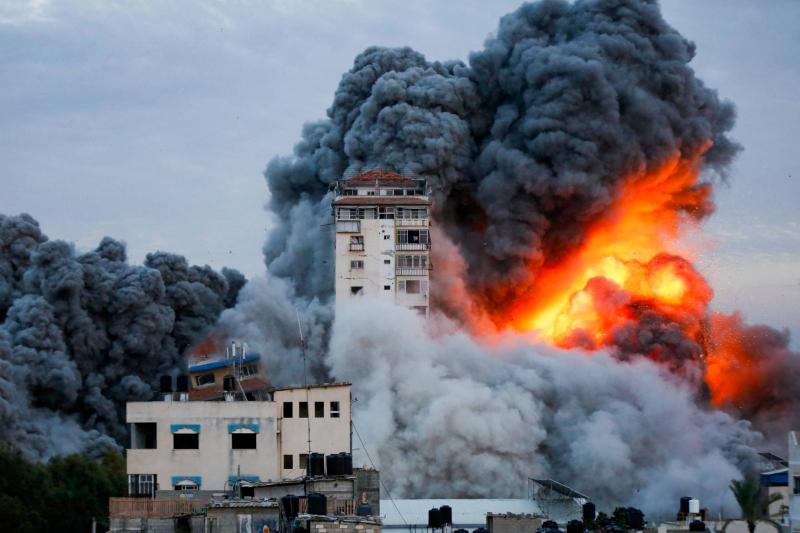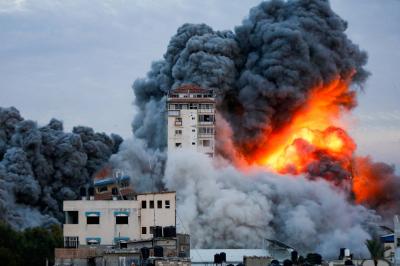A senior Israeli security source and two former high-ranking officials confirmed that "any military incursion carried out by Israel in the crowded southern Gaza Strip in the coming days could be more complicated than its ground assault in the northern sector, with a higher probability of civilian and military casualties." An Israeli military spokesman mentioned yesterday that "the military operation against Hamas will make its way to southern Gaza," but did not specify a timeline. Southern Gaza experienced a wave of shelling on Thursday in the vicinity of Khan Younis, raising concerns among displaced Palestinians seeking shelter there that the anticipated military attack has become imminent.
Hundreds of thousands of Gaza residents have fled to the southern part of the Strip in recent weeks after being urged by Israel to leave northern areas. Many now feel fear after leaflets were dropped near Khan Younis, urging them to leave their locations again, but this time toward the west. Israel issued a new warning to Palestinians in Khan Younis today, urging them to stay away from the fire range and to approach humanitarian aid before aerial strikes commence. Former head of the Israeli National Security Council, Giora Eiland, noted that "the ground attack could take between three to four weeks to suppress Hamas resistance in the south, where the movement's leadership is now concentrated." He added in statements to Reuters: "One of the toughest challenges is that most of the Gazan population is now concentrated in the south... more civilians may fall... this will not deter us or prevent us from moving forward."
The increasing civilian casualties from the attack have sparked outrage throughout the Middle East and among Western nations, including the United States, Israel's closest ally. Navy Colonel Daniel Hagari, the Israeli military's chief spokesman, said in a press conference yesterday that the expanded attack will start "when the armed forces see it as the best time for it." He added: "We are determined to continue our operation. It will be everywhere Hamas is, including the southern sector," without providing further details.
**US Call for Humanitarian Corridors**
Washington has supported the Israeli military campaign aimed at eliminating Hamas, but has stopped short of calling for a ceasefire, instead urging for shorter pauses to allow humanitarian aid to enter the 2.3 million residents of Gaza. The United States stated: "A large number of casualties have already fallen among civilians." Matthew Miller, spokesman for the US State Department, noted, "We have had discussions with them to convince them that they need to ensure the existence of... humanitarian corridors for civilians while they continue to consider carrying out ground operations or expanded military actions in other parts of Gaza."
Israel claims it is doing everything possible to minimize civilian casualties in its military operations; however, Prime Minister Benjamin Netanyahu stated on Thursday that those efforts "have not succeeded," describing the death of any civilian as a tragedy. As Palestinians become effectively trapped, the second phase of the Israeli military campaign poses risks that exceed the initial phase. Estimates from the United Nations based on data from Palestinian authorities indicate that about 400,000 residents of Gaza have been displaced towards the south.
The senior Israeli security source expected "the fighting in the south to be more intense and fierce, with more casualties likely on both sides." He added that "the city of Khan Younis represents a power base for Hamas leader Yehya Sinwar." For his part, Hamas leader Osama Hamdan, residing in Beirut, confirmed to the Islamic Republic News Agency that "the resistance still considers itself at the beginning of the confrontation, with determination and resolve to continue."
**Consequences in the South**
The Israeli military reported that more than 50 soldiers have been killed since the ground attack began until Thursday, compared to 66 soldiers killed during the last major incursion in 2014. The senior Israeli security source, who requested anonymity, stated: "The situation in Khan Younis will be extremely difficult because many terrorists have fled there and are carrying out operations there." He predicted that the military campaign in the south might seriously begin within days and could take a long time, potentially up to a month, to reach the Egyptian border.
The Israeli source and former officials indicated that "the concentration of the population in the south means that the airstrikes are unlikely to be as intense as they were in the north." They added that "the military might seek to encourage civilians to head to UN camps in search of safety." However, UN agencies state that their operations in Gaza "have been virtually paralyzed due to the Israeli blockade, and their schools and other facilities are already full of displaced people."
At the beginning of the conflict, the Israeli military urged displaced Palestinians to head to the Mawasi area, a sandy area with some groves near the southern coast, but it is prone to flooding. Rain has already begun to fall, some of it heavy. Fleeing south toward Egypt is not an option. The Rafah border crossing between Gaza and Egypt is the only exit that does not lead to Israel and is only open to foreigners, dual nationals, and patients in dire need. Hospitals in Gaza have closed their doors due to fuel shortages.
Egypt and other Arab countries believe that Palestinians should not leave the Strip, fearing a repetition of land confiscation, similar to what happened to hundreds of thousands who fled across the border and never returned to their homes following Israel's establishment in 1948.




